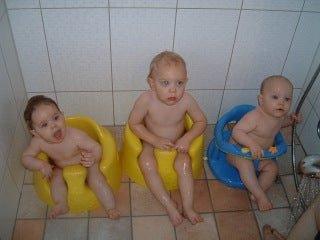It is important to realise that children need both their parents. The input of both parental temperaments – and the rich tapestry of what each parent brings to the child’s development. How can Dads make a real difference in the lives of their children?
In my article Adjustment to parenthood I discussed the various ways in which a parent is affected by the birth of each baby – especially the first one. I mentioned that it can be categorised as one of life’s most traumatic events. It certainly is life changing. However, as is the case with any crisis, adjustment is possible and, if positively handled, can also prove to be a wonderful opportunity for personal growth.
Traditionally the emphasis has been on the role of the mother in the bearing and nurturing of babies and young children. Dad was seen as the provider and his role was seen as being more important as the children grew older. Caring for children was seen as “women’s work”. Changing nappies, feeding, bathing and getting up at night were largely tasks assigned to the mother. When a Dad did venture into this female / baby territory, he often felt somewhat embarrassed. Over the years many Dads, who strive to be more modern and involved in child raising, have shared with me that, even when they do try hard to attempt these tasks, they feel clumsy and inept. One Dad told me recently that, when he really tries, his partner hovers over him and tells him how it should be done. His response was that he felt that he might as well leave it to her, as she clearly does it better. This is a great pity. It is a basic principle of effective communication that, if we wish to encourage a person to develop their skill in a particular area, we need to be patient and understanding. Offering encouragement, accepting that there are different ways in which to do things, allowing the other person to learn from mistakes etc is sometimes difficult, but is essential in this matter of co-parenting children. Obviously one would not allow blatant mistakes – which might have a negative impact on the child. But, as in the case of allowing our children to learn from trying and finding their own ways to accomplish tasks, we need to develop this ability with our partners.
Society has changed enormously over the past 50 – 100 years. Mothers now choose to continue their careers after child birth, or they are forced to do so due to economic necessity. I have been distressed by the numbers of mothers who are working a full day and then still attempting to take on the primary role in child care. Many working mothers work all day, collect children from day care or school, shop, cook, see to homework etc. And their partners appear to believe that this is till her role. A Dad said to me a while ago that he just feels that she does it all better. He will lend a hand when necessary, but still prefers to take on the more masculine tasks – mowing lawns, taking out the garbage, fixing the gadgets. These are all necessary tasks, but the children do need a father’s emotional connectedness and genuine interest in their lives. And the mothers do need to feel that there is a balanced approach to the role of parenting the children. There is no doubt that I have seen a really positive change in the attitudes of fathers towards their parenting role. Many new Dads will make it very clear that they intend to be as fully involved as possible – right from the start. And they do an amazing job when they are genuinely committed. Gone are the days when the new Dad would be excluded from the planning for the birth and definitely not welcomed in the delivery room. The typical picture of the father pacing the corridors and then being admitted once the baby was safely delivered, wrapped and the Mom all cleaned up and ready to introduce the new arrival to his/her father. The support and involvement of Dad in the labour ward and delivery room, are now considered to be very important. After all, he did have quite a part to play in the making of this new little person!
How can Dads make a real difference in the lives of their children?
1) Support his partner through her pregnancy: Dads need to be involved in the whole process. His partner needs to know that he is genuinely committed to being by her side. His empathy and interest will be the most important “gift” he can give her. And this will facilitate the bonding process, as he will feel more actively connected to his baby.
2) Understand fully just how enormous the changes are for his partner: While there are huge changes for him too, those expected of the mother are really daunting. Her hormones will be out of balance for quite some time. She will possibly have mood swings and even levels of post natal depression. She may feel confused, lonely and even resentful of the enormity of the impact on her life. The ability to show empathy, to try to understand that this is not personal but that with calm handling, will pass. Often the most important role of the new Dad, is to support the Mom, so that she can develop confidence in her ability to cope with the demands of the new born.
3) Express needs and feelings: Dads are so crucial to the family equilibrium, that, when the new Dad feels unappreciated or side lined it is so important that he does not suppress his feelings of resentment/ confusion. He may need to set some of his negative feelings aside for a while, as the needs of the Mom and baby will take precedence initially, but this should not be allowed to gather too much momentum, as unexpressed negativity almost always leads to eventual outbursts or emotional disconnection.
4) Accept that sex may be on the back burner for a while: Many a new Dad has felt really side lined by the arrival of the baby. “She seems to have fallen in love with our baby and out of love with me “ is expressed by many a new father. The truth is that she needs to be totally immersed in this new little person. She is exhausted and the last thing on her mind is a romantic evening involving sex. This will return. Maybe not immediately after the 6 week check up, but, with patience and understanding it will reignite. Many a new Mom has shared that she feels so bad because she actively pulls away from intimacy. “ When I hold his hand or hug him, he feels that this is the signal for more intimacy. But all I want is the hug or the hand holding.” Persevere with the signs of affection. Help her feel good about herself. Many new Moms suffer from feelings of low self esteem, as they battle with their post pregnancy sagging tummies and leaking breasts. Not very appealing to her or her partner. With positive input and genuine connection, these initial hitches will almost certainly evolve into a closer and warmer understanding of each other- and your baby will benefit enormously.
5) Develop confidence in your role as father: While many Dads feel enormous responsibility for providing financially for the family, especially after the birth of the baby, and there is no doubt that this role is vital for the immediate and longer term well being of the family, it is important not to lose sight of the need to remain closely connected to the family – physically and emotionally. Fathers often share that they feel more confident when the babies get a bit bigger and can do “real things” - like play at the park, swim, play games etc. This is very important and Dads do often provide the physical elements in the child’s life – like camping, climbing, doing the more exciting activities.But Dads also need to show that they can be empathetic and “soft”. To connect to the child’s emotional world. Especially with sons. Dads can role model that it is the sign of a real boy who can show feelings, cry when he needs to, and generally show that having a softer side is not “ un masculine”.
Daughters need their Dads every bit as much as boys need them. Play Barbie dolls with them, encourage their fairy fantasies and go to watch the ballet concerts. Girls who have close bonds with their Dads are really well prepared for future relationships with males.
Finally, it is so important to realise that children need both their parents. They need the influence of both. The input of both parental temperaments – and the rich tapestry of what each parent brings to the child’s development. It is, in my opinion, a really positive advance in the realisation of the importance of both parents, that fathers are receiving more equally balanced time with their children in the sad event that the parental relationship ends in separation and divorce.
This is an issue to be discussed separately, but suffice to say that Dads need to have as fair an amount of time with their children as is possible for their best interests.
Dads – do remember that you are vitally important in the lives of your children – as are their Moms. Connect to them physically and emotionally. Develop your skills and strategies. You provide a vital balance in their lives that they will be the poorer for being deprived of.
By Anne Cawood
Anne Cawood is the author of Children need Boundaries, Toddlers need Boundaries, Children need Grandparents and Adjusting the Boundaries. For more information from Anne Cawood go to www.boundariesinc.co.za or email her at anne@boundariesinc.co.za








